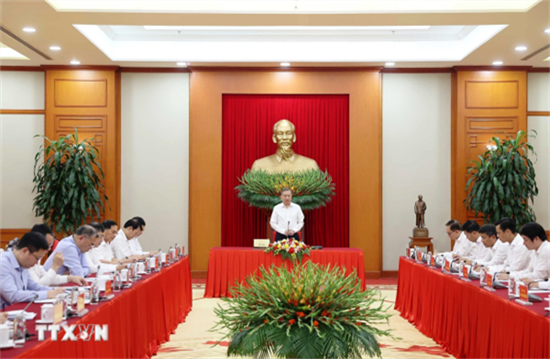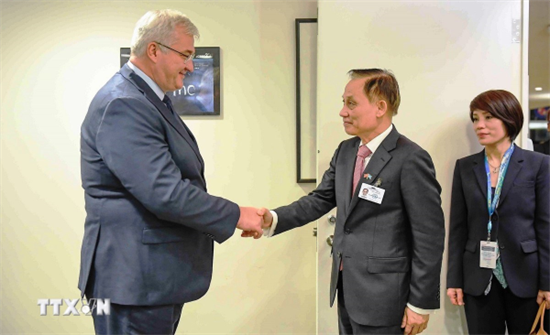“Implementing foreign affairs more synchronously, creatively, effectively, elevating and promoting the role of Party diplomacy, State diplomacy, and people-to-people diplomacy” represent one of the key tasks identified in the Draft Documents to be submitted to the 14th National Party Congress. Well performing this task will contribute to creating a peaceful, stable, friendly, cooperative environment and favourable conditions for national development in the new era.
History of Vietnam reveals that in each revolutionary period, with sound, consistent, flexible foreign policies, Vietnam’s foreign affairs have made significant contributions to the country’s development.
 |
| Party General Secretary To Lam works with the Party Committee of the Ministry of Foreign Affairs (photo: VNA) |
Under the Party’s leadership, after 40 years of Doi Moi (national cause of renovation), Vietnam’s fortune, potential, position, and international prestige have been raised as an important foundation for our country to enter a new era of development and successfully fulfil its established strategic objectives. Amongst those remarkable achievements, foreign affairs have played a significant role in enabling Vietnam to extensively, comprehensively integrate into the region and the world, maximising external resources, and laying a solid foundation for Fatherland construction and protection.
Amidst epochal transformations in the region and around the world, Party General Secretary To Lam affirms that the period from now until 2030 will be the most important one for shaping a new world order. This is also a pivotal and final stage for the Vietnamese revolution to achieve the goal for the Party’s 100th founding anniversary in 2030 as a solid foundation to fulfil the objectives and plans for the 100th founding anniversary of the Socialist Republic of Vietnam in 2045. For the sake of the promoted role of foreign affairs in the new era of development, our Party and State have outlined many major directions with new content for the country’s foreign policy. The Draft Documents for the 14th National Party Congress, the Politburo’s Resolution 59-NQ/TW, dated 24 January 2025, on international integration in the new situation, and directive statements of Party General Secretary To Lam firmly affirm that strengthening foreign affairs and international integration is a crucial and routine task. The Party General Secretary also emphasised that Vietnam’s foreign affairs and diplomacy must be developed to new heights to contribute to raising the country’s role and position in global politics, the world economy, and human civilisation.
Generally, Vietnam’s foreign policy in the period of Doi Moi has always adhered to Marxism - Leninism, Ho Chi Minh’s ideology, and the nation’s diplomatic tradition; it has been inherited and developed in the Party’s national congresses. However, amid rapid, complex situational changes on global and regional scales as well as intertwined opportunities and challenges, coupled with the great achievements in the past 40 years of Doi Moi and the aspiration for national rise, more than ever, Vietnam’s foreign affairs need to achieve more robust development, promote the pioneering role, and make a worthy contribution to realising the strategic objectives in the new era of national development.
First of all, continuing to uphold the principle of putting national interests above all else. To that end, all foreign affairs activities must aim to safeguard national independence, sovereignty, unity, and territorial integrity, protect the Party, State, people, and socialist regime whilst it is necessary to create a favourable condition for facilitating economic growth and improve the people’s life. The highest guarantee of national interests must be based on the fundamentals of the United Nations Charter and international law, on the protection and maintenance of a peaceful, stable environment for national development and the people’s happiness, and on equitable and mutually beneficial cooperation. In the process, it is essential to conform to the motto of being “firm in objectives, flexible in strategies and tactics”, consistently pursue the foreign policy line of independence, self-reliance, peace, friendship, cooperation, development, multilateralisation and diversification of foreign relations, uphold flexibility in conduct, take advantage of opportunities from the trend of cooperation and integration, and remain proactive in responding to risks of competition and conflicts of interests. This is Vietnam’s diplomatic style based on our ancestors’ tradition. Foreign affairs and diplomacy should focus on “leveraging external strengths to serve internal needs”, learning lessons from other countries and applying them to our country’s realities. In the new era, foreign affairs need to continue contributing to ensuring a peaceful, stable environment for national development while taking development as a top priority and precondition for safeguarding the nation’s interests.
Second, further promoting the central, routine role of foreign affairs. Foreign affairs should closely collaborate with other sectors and forces, particularly the Military and the Public Security Force to maintain a peaceful, stable environment and firmly protect the Fatherland. It is vital to proactively research, grasp, and correctly forecast global situational developments that could impact on national defence, security, and interests to give advice to the Party and State on strategies to address difficulties and challenges early and from afar. Besides, it is essential to develop new diplomatic forms relevant to the country’s development needs and orientations in the new era. Due attention should be paid to closely combining economy with defence and security and fostering economic cooperation in the border area with neighbouring countries to contribute to building a border of peace, friendship, cooperation, and development.
Furthermore, it is necessary to comprehensively, harmoniously combine political diplomacy, economic diplomacy, cultural diplomacy, science - technology diplomacy, agricultural diplomacy, and environmental diplomacy with other related fields; in this regard, political diplomacy is of central significance, economic diplomacy is of breakthrough significance, and cultural diplomacy is of fundamental significance. In particular, political diplomacy should continue to cement political trust, deepen the intertwining of interests with partners, and well manage overall relations with neighbouring countries, major powers, and key partners, contributing to creating new advantages and strength for the country. Economic diplomacy must stimulate internal resources, open up new development prospects, create breakthroughs in sustainable economic growth, maintain healthy, stable macroeconomic development, and effectively respond to new global challenges, such as climate change, energy security, cybersecurity, natural disasters, and epidemics.
Third, building active, proactive, creative, well-connected diplomacy that greatly contributes to realising the goals of national development. To do so, the Diplomatic Sector should play a more active, proactive, creative pioneering role in connecting the country with the world and the times, engaging Vietnam in addressing the world’s common issues, preserving and unceasingly nurturing the affection of people around the world towards Vietnam and its population. It is essential to frequently raise Vietnam’s position in global politics, the world economy, and human civilisation, take part in settling global and regional common issues more effectively, and make contributions to the world’s peace, stability, and development, global civilisation, and humankind’s happiness, thereby creating new advantages and strength and a favourable international environment for the Vietnamese revolution, raising the country’s power and status.
 |
| Secretary of the Party Central Committee, Acting Minister of Foreign Affairs of Vietnam Le Hoai Trung meets with Ukrainian Foreign Ministers Andrii Sybiha (photo: VNA) |
Fourth, prioritising relations with major powers, cleverly, harmoniously managing relations with other countries and regional and global organisations. To this end, the Diplomatic Sector should closely work with ministries and other sectors to give advice to the Party and State on managing relations with other countries, especially major powers in a balanced, flexible manner so as to ensure national interests and mitigate potential risks and adverse impacts early and from afar. It is necessary to take advantage of economic potential and make breakthroughs in economic relations with major powers and especially other countries having significant untapped potential for cooperation in economy, trade, and technology. Vietnam should be ready to act as a bridge for dialogue between major powers, aimed at effectively managing hot spots and disagreements for all relevant parties’ common interests and for global and regional peace, cooperation, and development.
Vietnam should keep consolidating its strategic environment by deepening and sustaining bilateral and multilateral relations with ASEAN member states, and actively contributing to cementing ASEAN unity and ASEAN’s central role in the regional architecture. It should closely collaborate with other member states to foster ASEAN relations with external partners, particularly major powers and centres of power around the world. At the same time, it should demonstrate its role in addressing issues relating to regional peace, security, and development, and proactively take part in shaping new frameworks and rules, especially technology-related ones to best guarantee national interests.
Fifth, building a contingent of cadres in charge of foreign affairs on a par with their tasks. During his working session with the Party Committee of the Ministry of Foreign Affairs on 29 August 2024, Party General Secretary To Lam stressed that those engaged in external affairs must be “the most typical socialist Vietnamese” with deep knowledge of international law, the host countries’ tradition, customs, culture, and laws, as well as the principles of foreign relations and international cooperation. To develop a corps of “both red and expert” diplomatic cadres as true “global citizens” capable of working in multi-cultural, multi-media environments, the Ministry of Foreign Affairs, as the core, specialised agency, together with other sectors, should continue to comprehensively reform the training and development of diplomatic personnel to ensure that those cadres will have firm political will, good knowledge of cultural and protocol sensitivity, broad general knowledge, and all-round skills at international level, uphold innovation, and make practical contributions to achieving the country’s foreign policy objectives in the new period.
There should be scientific, appropriate plans for the appointment, utilisation, and rotation of diplomatic personnel in a “compact, effective fashion”; there should also be mechanisms and policies to attract talented individuals, both at home and abroad, to work in the Diplomatic Sector. Adequate material resources and working conditions must be ensured to enable diplomatic personnel to keep their mind on their work. Special attention should be paid to remuneration policies based on diplomatic ranks for both domestic personnel and members of Vietnamese diplomatic missions abroad.
In the new development era, Vietnam’s foreign affairs are undertaking arduous but very glorious missions. Inheriting the nation’s tradition of peace-loving diplomacy and Ho Chi Minh’s diplomatic ideology, Vietnam’s foreign affairs will continue to bolster the country’s diplomatic history and contribute to realising the strategic goals of national construction and protection, raising Vietnam’s position and prestige in the international arena, and enabling the country to stand shoulder to shoulder with great powers of the five continents as Uncle Ho once wished.
VU DUY THANH, PhD
Ministry of Foreign Affairs